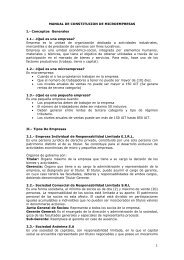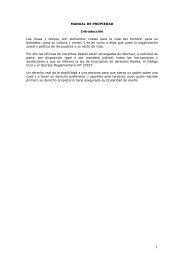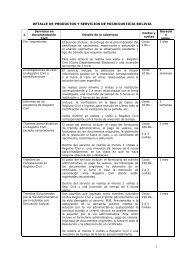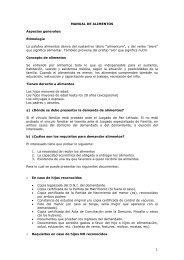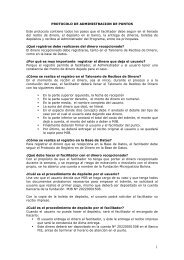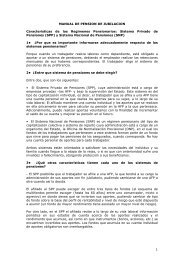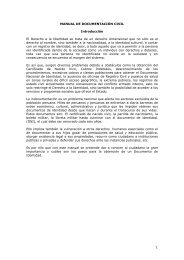ICISS report - International Coalition for the Responsibility to Protect
ICISS report - International Coalition for the Responsibility to Protect
ICISS report - International Coalition for the Responsibility to Protect
Create successful ePaper yourself
Turn your PDF publications into a flip-book with our unique Google optimized e-Paper software.
The <strong>Responsibility</strong> <strong>to</strong> <strong>Protect</strong> 53<br />
WHEN THE SECURITY COUNCIL FAILS TO ACT<br />
6.28 We have made abundantly clear our view that <strong>the</strong> Security Council should be <strong>the</strong> first<br />
port of call on any matter relating <strong>to</strong> military intervention <strong>for</strong> human protection purposes.<br />
But <strong>the</strong> question remains whe<strong>the</strong>r it should be <strong>the</strong> last. In view of <strong>the</strong> Council’s past<br />
inability or unwillingness <strong>to</strong> fulfill <strong>the</strong> role expected of it, if <strong>the</strong> Security Council expressly<br />
rejects a proposal <strong>for</strong> intervention where humanitarian or human rights issues are significantly<br />
at stake, or <strong>the</strong> Council fails <strong>to</strong> deal with such a proposal within a reasonable time, it<br />
is difficult <strong>to</strong> argue that alternative means of discharging <strong>the</strong> responsibility <strong>to</strong> protect can be<br />
entirely discounted. What are <strong>the</strong> options in this respect?<br />
The General Assembly<br />
6.29 One possible alternative, <strong>for</strong> which we found significant support in a number of our<br />
consultations, would be <strong>to</strong> seek support <strong>for</strong> military action from <strong>the</strong> General Assembly<br />
meeting in an Emergency Special Session under <strong>the</strong> established “Uniting <strong>for</strong> Peace” procedures.<br />
These were developed in 1950 specifically <strong>to</strong> address <strong>the</strong> situation where <strong>the</strong> Security<br />
Council, because of lack of unanimity of <strong>the</strong> permanent members, fails <strong>to</strong> exercise its primary<br />
responsibility <strong>for</strong> <strong>the</strong> maintenance of international peace and security. Since speed will often<br />
be of <strong>the</strong> essence, it is provided that an Emergency Special Session must not only be convened<br />
within 24 hours of <strong>the</strong> request being made, but must also, under Rule of Procedure 65 of <strong>the</strong><br />
General Assembly, “convene in plenary session only and proceed directly <strong>to</strong> consider <strong>the</strong> item<br />
proposed <strong>for</strong> consideration in <strong>the</strong> request <strong>for</strong> <strong>the</strong> holding of <strong>the</strong> session, without previous<br />
reference <strong>to</strong> <strong>the</strong> General Committee or <strong>to</strong> any o<strong>the</strong>r Committee.”<br />
6.30 Although <strong>the</strong> General Assembly lacks <strong>the</strong> power <strong>to</strong> direct that action be taken, a<br />
decision by <strong>the</strong> General Assembly in favour of action, if supported by an overwhelming<br />
majority of member states, would provide a high degree of legitimacy <strong>for</strong> an intervention<br />
which subsequently <strong>to</strong>ok place, and encourage <strong>the</strong> Security Council <strong>to</strong> rethink its position.<br />
The practical difficulty in all of this is <strong>to</strong> contemplate <strong>the</strong> unlikelihood, in any but very<br />
exceptional case, of a two-thirds majority, as required under <strong>the</strong> Uniting <strong>for</strong> Peace procedure,<br />
being able <strong>to</strong> be put <strong>to</strong>ge<strong>the</strong>r in a political environment in which <strong>the</strong>re has been ei<strong>the</strong>r<br />
no majority on <strong>the</strong> Security Council, or a ve<strong>to</strong> imposed or threatened by one or more<br />
permanent members – although Kosovo and Rwanda might just conceivably have been such<br />
cases. The Commission believes, none<strong>the</strong>less, that <strong>the</strong> mere possibility that this action<br />
might be taken will be an important additional <strong>for</strong>m of leverage on <strong>the</strong> Security Council <strong>to</strong><br />
encourage it <strong>to</strong> act decisively and appropriately.<br />
Regional Organizations<br />
6.31 A fur<strong>the</strong>r possibility would be <strong>for</strong> collective intervention <strong>to</strong> be pursued by a regional<br />
or sub-regional organization acting within its defining boundaries. Many human catastrophes<br />
will have significant direct effects on neighbouring countries through spill-over across<br />
national borders taking such <strong>for</strong>ms as refugee flows or use of terri<strong>to</strong>ry as a base by rebel<br />
groups. Such neighbouring states will thus usually have a strong collective interest, only part<br />
of which will be motivated by humanitarian concerns, <strong>for</strong> dealing swiftly and effectively<br />
with <strong>the</strong> catastrophe. It has long been acknowledged that neighbouring states acting within<br />
<strong>the</strong> framework of regional or sub-regional organizations are often (but not always) better<br />
placed <strong>to</strong> act than <strong>the</strong> UN, and Article 52 of <strong>the</strong> Charter has been interpreted as giving <strong>the</strong>m<br />
considerable flexibility in this respect.



